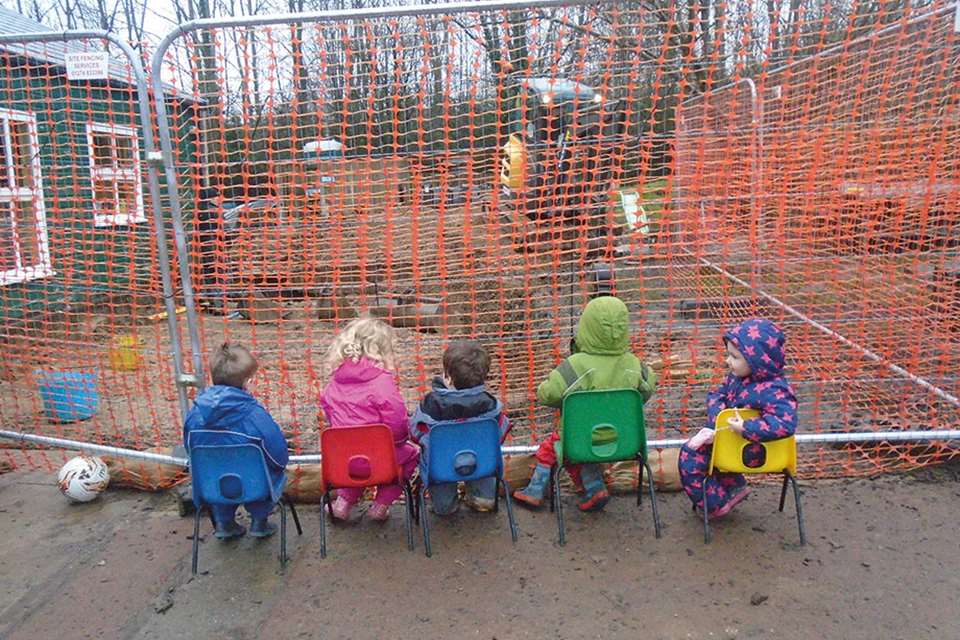Management - Darwin’s lessons
Hannah Crown
Monday, June 12, 2017
A little knowledge of some evolutionary principles can help settings face up to the challenges ahead, explains Jacqui Burke

Charles Darwin once said, ‘It’s not the strongest of the species that survives, but the one most responsive to change.’ This is likely to be true for the early years and childcare sector over the coming years. ‘Change-ability’ should perhaps be considered our most essential business skill.
In this article, I’ll examine some of the challenges impacting the sector and help you to think about how you and your early years business can better face up to them.
A COMPLEX CONTEXT
History is likely to show the past couple of years as a period of significant change for the UK. We’ve had two referendums (Brexit and Scotland), two General Elections, one change of Prime Minister (at the time of going to press!), major upheaval within all of the major political parties – and that’s just in the UK. Add to that the US election result and major turmoil around the globe and we can see how challenging the context has become.
Many of these events can seem to have little relevance for an early years business. But look at how sub-prime lending to homebuyers in the American Mid-West led to a global banking crisis: most UK businesses and individuals have been and continue to be affected.
For the early years and childcare sector, specifically, change continues to be imposed upon us at an unprecedented rate, creating a climate of confusion, disillusion and hostility. The 30 hours policy has meant early years businesses having to review every aspect of their delivery model – from opening hours to ratios, charging strategies and marketing plans. The degree of complexity involved in making changes to so many interlinked aspects of their business at once has meant that managers who lack change management and strategic business planning skills have, in some cases, found themselves unable or unwilling to make the changes needed to survive sustainably, and have decided to call it a day. How many small, committee-led settings will cope with such an environment?
This unsettled environment creates business opportunities for others to step in. We can see from other sectors that the sort of industry disruption caused by newcomers such as Uber, Airbnb and various online retailers has been transformational. Early years providers are likely to see more structural change in the sector involving mergers and acquisitions, as well as new entrants to the market, making it more challenging for smaller providers to compete.
Given this, I am still surprised at the frequency with which I hear people say things like ‘When we get back to normal…’, or ‘When we have a change of government, it’ll be OK’. Such wishful thinking holds us back from moving on. It creates a false impression that holding on to the past is the best course of action. Letting go of what once was can be hard and painful, but is an essential first step in managing change.
DEVELOPING CHANGE-ABILITY
So my recommendation for leaders and managers of childcare settings is to acknowledge Darwin’s words and embrace change by developing change-ability.
Change-ability for an individual is made up of a number of elements: our willingness to proactively seek out opportunities to change, our ability to see change in a positive light, our flexibility and personal resilience when change is being imposed on us at a rapid rate. Personal coaching can be a big help in developing this skill.
For a business, change-ability means developing business resilience through the introduction of things such as strategic planning involving scenario planning (looking at the ‘what ifs’), flexible staffing, succession planning, and risk management rather than risk avoidance.
Here are my recommended ten steps to developing your change-ability:
1. Understand the context for your early years business – it’s important to regularly conduct a PESTLE analysis, where you review all of the external factors that might impact your early years business and cause you to make changes (see below).
2. Keep yourself up to date – sign up to updates from government organisations such as Ofsted and the DfE, or your membership organisation. Follow useful organisations on Twitter. Look at Nursery World in print and online.
3. Keep an open mind – adapting to a changing context requires an element of trial and error. Darwin found that species survived in changing environments by making adaptations to their DNA from one generation to the next. Not all of these worked. So, be prepared to consider things that might have previously been unthinkable for you and your setting; for example, opening during the school holidays. Try things out: run a pilot or do something for a test period and then evaluate it.
4. Undertake well-informed business planning – use your understanding of your context to help you to anticipate the future. Make sure that the plans you put into place are grounded in reality and not in wishful thinking by completing a PESTLE analysis each year and by conducting robust market research into the needs of parents locally.
5. Develop change-management skills – change-ability is crucial for those who make key decisions about your business, so invest in some training on change management. Being able to look at the change required and break it down into bite-sized chunks can make it easier to manage and help people feel less overwhelmed. It also acknowledges that sometimes tiny tweaks can have a big impact – less than 4 per cent of a chimpanzee’s DNA is different from ours, but look at the impact that tiny difference has made.
6. Encourage your staff – help your team to become more open to change, recognising that some may need support from management to embrace change fully and to become more resilient. Make sure that you and your team have a thorough understanding of how staff might react to change, and how you need to support them through effective communication and coaching.
7. Collaborate – work with others who share your vision for the future and may be able to help you along the way by building a supportive network.
8. Communicate – the biggest complaint that I hear about change is often that people aren’t kept fully informed. Communicating information in the right order is also important. All too often we launch straight into how things will be changed. It’s important to begin by explaining clearly what needs to change and why; help people understand how this will affect them personally; then get into the detail of how the change will be implemented.
9. Evaluate and learn – there will be lessons to be learnt from implementing change; identify these by checking back with people such as staff and parents to help you to understand what worked well and could have gone better, and then use this knowledge to improve how you introduce the next changes to your business.
10. Celebrate success – when a change has been implemented successfully, acknowledge the effort that has gone into making the change. Communicate your success widely, naming the people who have contributed to it, and remember that a ‘thank you’ goes a long way.
I’m going to end with another quotation: ‘The best way to predict the future is to create it.’ Often attributed to management guru Peter Drucker, this is about applying a sense of being proactive about where your business is going. Change that is imposed on us by outside circumstances is usually more difficult to get to grips with than change that we have decided to make ourselves. So I would encourage business leaders in our sector to build their change-ability and set about creating the future.
PESTLE ANALYSIS
POLITICAL
Brexit uncertainty about impact or timescales
Elections policy shifts?
Austerity policy continues - removal of LA support
Childcare in schools - increased competition
Welfare reforms1 pressure on women to return to work
TECHNOLOGICAL
Parents’ expectations online booking, e-invoicing, social media updates, etc
Government expectations electronic communications
Tax-free childcare/30 hours new online systems
E-safety risks cyber security
New systems staff training, hardware, software costs
Poor internet in rural areas1 can’t connect with parents or government systems
ECONOMIC
Low interest rates favourable borrowing terms
Fall in £ higher costs
Wages and pensions costs are rising, including rent and business rates
30 hours free entitlement funding rate sustainability challenges
Apprenticeships changes to qualifications regime
LEGAL
DBS checks admin burden
Regulation changes, e.g. paediatric first aid keeping up to date and compliant, retraining
Employment law changes following Brexit currently unknown/keeping up to date and compliant
Ofsted understanding recent changes to EYFS and Common Inspection Framework
SOCIAL
Low unemployment more women working means greater need for childcare and more job applicants
Immigration diverse communities, need for cultural and language awareness
New housing developments increased demand
Parents’ expectations high-quality provision
ENVIRONMENTAL
Climate change flooding risk; increased insurance premiums or no cover
House-building new families
Premises expansion builders on site; safeguarding concerns
Reduced bus services in rural areas drop in numbers and eventual closure
Cost of nappy disposal and other waste disposal costs rising
Jacqui Burke is a business consultant who specialises in supporting early years business owners and managers: www.flourishingpeople.co.uk. She is author of Building Your Early Years Business, published in February by Jessica Kingsley.







